#chronically couchbound
Text
It IS ableist to laugh at politicians displaying symptoms of disorder.
It IS ableist to say that them becoming disabled is punishment for being shitty.
It IS ableist to say that a politician becoming disabled is a reason they shouldn’t be in office.
Those politicians are shitty. That’s it. You don’t have to being disability into it. Disability isn’t a punishment for being shitty. Disability isn’t the reason they shouldn’t be in office.
Also, that politician isn’t who sees you laughing at them for being visibly disabled— it’s your disabled community members who do.
Tbh, I hate most politicians. But them being disabled, fat, etc. isn’t why I hate them. I don’t need to talk about it at all actually. You can point out egregious human rights violations and abuses without ever mentioning them being disabled. When you actually hate someone for being shitty and harmful, but all you make jokes about it their disability, you’re not accomplishing anything helpful aside from furthering ableist stereotypes.
Stop and consider: Does this joke actually bring light to the ways they’re genuinely awful, or does it just make people hate them for being a part of a marginalized community?
It’s thinly veiled ableism and y’all will say we’re sympathizing when we’re literally just saying don’t pin their shitty behavior on them being disabled.
You can hate someone’s actions and leave their disabilities out of it.
#chronically couchbound#I’m so fucking tired of this#disability#disabled#cripple punk#cripplepunk#ableism#mitch mcconnell
6K notes
·
View notes
Text
The Whale: A Lot of Emotional Blubber
Courtesy of A24
Plot via IMDB:
Idaho, 2016. Scarred by the profound wounds of grief and guilt, couchbound Charlie, an online writing instructor living with chronic obesity, now has a crystal-clear view of his secret intentions. And confined to his claustrophobic and musty apartment, the self-destructive shut-in has all the time in the world to contemplate the damaging faults of the past,…
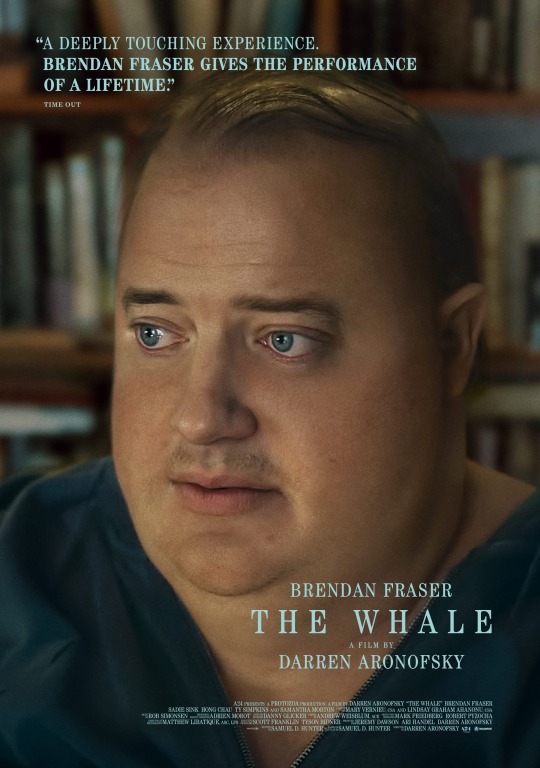
View On WordPress
0 notes
Text
little known facts of being a bodybuilder
I know I have a lot of friends who struggle with that chronic illness/pain, and I know this is nothing compared to what they experience daily. So I’m keeping this in perspective, I promise.
Still, when you’re used to being active, and for several days you’re bed/couchbound? Your whole body aches. Not debilitatingly, but persistently enough to be a real annoyance. All the more so because you know it means you’re going to have to work your ass off to get back into shape.
#also my biceps are visibly smaller#and lemme tell you bro#when i think about how hard i worked on these#its a real bummer#guess its time to be all zen and shit#a time to build and a time to detrain
3 notes
·
View notes
Text
I’m allowed to be lazy. Disabled or not. Laziness isn’t an inherently bad thing y’all just too caught up in hyper capitalist hustle culture to care. I don’t owe you productivity. I’m allowed to rest.
My rest is radical.
#chronically couchbound#disability#disabled#cripple punk#cripplepunk#disabled pride#disability pride#lazy#i'm lazy#im lazy#chronic fаtiguе ѕуndrоmе#chronic illness#chronically chill#chronic disability#chronically ill#chronic fatigue#cfs (chronic fatigue syndrome)#me cfs#cfs/me#spoonie#spoonie community#spoonies#low spoons#radical rest#tired#rest#this shit is exhausting#leftist#anti capitalism#abolitionist
7K notes
·
View notes
Text
Sometimes you’re gonna have access needs that are incompatible with another disabled person’s and that’s valid.
Neither of you are inherently ableist for not being able to accommodate each other’s needs.
#disability#chronically couchbound#disabled#disability pride month#disabled pride#disabled pride month#disability pride#accessibility#access needs#accomodation#disabled rights#disabled community#affirmations#ableism
3K notes
·
View notes
Text
The narrative that “you should care about disabled people because one day that’ll be you” is ableist in and of itself.
You should care about disabled people’s rights because you should care about the disenfranchisement of a marginalized community.
Becoming disabled is not a punishment. Becoming disabled is not a threat. Becoming disabled is not cosmic retaliation for being ableist. Becoming disabled is morally neutral.
#disability#disabled#cripple punk#cripplepunk#disabled pride#disabled pride month#chronically couchbound#disability pride#disability pride month#disabled joy#disabled liberation#disabilties#becoming disabled#accessibility#anti ableism#ableist bullshit#ableism#fuck ableists#abledsareweird#ableist tw#ableist people#ableism cw#ableist nonsense#ableist society#ableist tropes#stop being ableist#ableists dni#disability theory#disability studies#social model of disability
4K notes
·
View notes
Text
Ugly Laws. Creepy coming from the word cripple. Freak shows. Fear of clowns. Bearded ladies with PCOS & intersex variations. Contortionists with EDS. Little people. “Missing links” people with Microcephaly. “Snake man” people with limb differences. Lack of welfare programs. Disability rights. All of these things are connected.
#chronically couchbound#disability#disabled#disabled pride#disability pride#cripple punk#cripplepunk#freak show#freaks#cripple#creepy#ugly laws#pcos#intersex#disability rights#crip rights#cripple pride#cripple posting#cripple life#cripple shit#angry cripple#ableism#public welfare
3K notes
·
View notes
Text
Being born with red hair is just as common as having green eyes and just as common as having Dissociative Identity Disorder and just as common as being intersex.
#I'm not a red head but#green eyes#did system#intersex#Dissociative identity disorder#not that rare#chronically couchbound#disabled#cripplepunk#disability#cripple punk#disabled pride#disability pride#actually did#did osdd
749 notes
·
View notes
Text
People who use drugs deserve love and kindness.
Abstinence is not the only form of recovery. AA/NA doesn’t work for everyone. Sometimes people choose to use instead of meeting other needs, which is valid. Some people use for recreational purposes. Some people use for medicinal purposes. Some people who use have substance abuse disorder. Treatment looks different for everyone. Not everyone needs or wants treatment, for various reasons. The only thing Naloxone enables is breathing. Active use is not shameful. People who use drugs often also deal drugs. People in recovery should not shame active users. Active users deserve love. Active users deserve someone to check in on them, get them safer use supplies, and get them pizza. Active users deserve to be listened to. They deserve better than to have that be the first time anyone ever treated them as human since they began using.
Let’s care for each other.
#chronically couchbound#tw drugs#recovery#narcan#naloxone#harm reduction#harm redux#drug usage#addiction#active users#people in recovery#harm reduction saves lives#naloxone enables breathing#abstinence#alcoholism#substance use#substance addiction#safe use#safe use supplies#harm reduction is mutual aid#mutual aid#community care#narcan saves lives#AA/NA#narcotics anonymous#alcoholics anonymous
3K notes
·
View notes
Text
I feel like people often don’t talk about the experiences of disabled people who have caretakers because so much of the conversation is about us—not including us.
I receive in home care for 30 hours a week (+ 4 hours/week for respite). This is paid for by Medicaid (state insurance). Outside of paid hours, my primary caretakers care for me unpaid and assist me most of the time. I’m very rarely left alone due to my high support needs. Often, when I am left alone, I am completely bedridden or at minimum housebound. I have frequent emergency life threatening health problems, falls, and serious injuries even with support in place, and these things significantly increase when I’m on my own.
I’m extremely lucky that my paid caretakers are my partner, my sister (the only family member I have regular contact with, I’m estranged from the rest of my immediate family and most of my extended family) and my best friend.
I used to have agency staffing which was horrible for me and borderline traumatic. At several points, before doing the self directed care option (which allows me to choose my own staff, hire and train them myself and dictate hours for them), I opted to not have any staffing. I was regularly in the emergency room. I can’t drive, so I was having to walk and if I was lucky enough to be able to take the bus on occasion or get a ride from a Facebook acquaintance, they were few and far in between. I don’t have family support, and even my sister who is supportive wasn’t living in the state at the time and doesn’t have a car most of the time.
And before I could even choose which staffing option, even though medically it had been deemed essential for me to have in home care, even though my insurance covered it, I had to wait several years (I was 18 when I was approved) until I was 21 to qualify to start. The reason why: I was legally an “adult disabled child” because of my high support needs (which is funny because I STILL don’t have SSI at age 24) and thus legally unable to consent to my own care plan. I needed a blood relative to consent, and that same blood relative (who had to have proof of such!) couldn’t care for me. At the time, my sister was the only person who could’ve been my caregiver and also she is the only verifiable blood relative I have contact with for safety reasons, and my only relative on this side of the USA.
The first business day after my 21st birthday I immediately got things set up to get in home care.
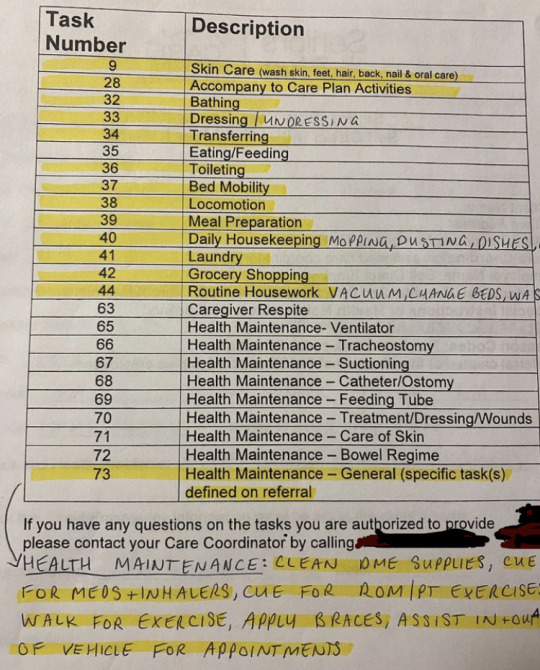
This is out of date, I get assistance with more than just these highlighted ADL (activities of daily living) tasks now.
In short: my day-to-day life is entirely dependent on others.
And there’s power imbalances that exist between me and my caregivers, even with my current caregivers being amazing and anti-ableist. They will always exist. We talk about the power dynamics of me being dependent on them for my survival, and how heavy that weight can be for each of us.
Having caregivers often means that accessibility is extra difficult— I’ve been told straight up multiple times that I can’t have assistance from my caregivers to help me change in a changing room when we’re out shopping. That they can’t go into the bathroom with me, that they can’t help me get un/dressed during appointments, that they can’t come into spaces with me.
I’ve been denied access to psychiatric care because I can’t do my daily living tasks (ADLs- the highlighted items) independently. And when I’m in a hospital or emergency room, I can’t have my in home workers be paid to care for me, there’s an expectation that the nursing staff at the hospital will do it. Even though my caregivers were specifically trained to learn my body and needs for weeks and have been working with me for years. I have severe cPTSD and showering in front of a stranger is something I cannot do. I would rather fall or faint or get injured or just not shower than deal with that. But I’m expected to just let anyone have access to my body just because I’m physically disabled and need support.
When I faint/fall/get injured/have life threatening health issues arise while I’m not clothed, or when I’m otherwise vulnerable, I’m supposed to let strangers just touch me however they want to. I have to show them my chest (for my cardiac care) and let them poke and examine me. I can’t object without losing access to vital care.
I have agency. I have rights. I have autonomy. I deserve to be able to exercise these things.
#chronically couchbound#disability#disabled#disabled pride#cripple punk#cripplepunk#disability pride#high support needs#ableism#professional caregiver#activities of daily living#ADL#medicaid#healthcare#in home care#home care#home care aids#nothing about us without us
1K notes
·
View notes
Text
Almost twice as many people died from COVID-19 in 2021 than all unintentional accidents. COVID-19 is the third leading cause of death. COVID rates are on the rise.
The least you can do is wear a mask.
#chronically couchbound#US Specific statistics#COVIDpunk#disability#disabled#covid19#covid isn't over#covid cautious#cripple punk#cripplepunk#disabled pride#disability pride#mask mandates#wear a mask#solidarity#disability rights#disabilities#disability advocacy#covid 19#covid#long covid#pandemic#public health#covid pandemic#coronavirus#leftist#leftist praxis#leftist theory#cripple shit#crip punk
1K notes
·
View notes
Text

Read the full post here
•
[ID: pink and pink outlined text on a dark background reads: “intelligence doesn’t equal morality. Caring for others can happen at any IQ level.” The side text reads “@ chronicallycouchbound” In the upper right hand corner is a simple diamond star shape graphic. End ID.]
#chronically couchbound#disabled#disability#intellectual disability#mental disability#TBI#tbi survivor#cognitive disability#developmental disabilities#developmental disability#audhd#adhd#actually audhd#autistic experiences#autistic#cripple punk#cripplepunk#neuropunk#dyscalculia#dyslexia#dyspraxia#actually disabled#anti intellectualism#intelligence#stupid#low iq#high iq#smart#stupidity#kindness
2K notes
·
View notes
Text
Let People On Food Stamps Eat Hot Meals
Particularly on cold, rainy days (like today), while unhoused, sometimes all I want is a hot meal but it’s so difficult (if not impossible) to cook outside in the rain.
On top of this, I’m physically disabled and chronically ill. Medically, I’m supposed to have assistance with making meals as part of in home care. But I can’t get in home care without a home.
I just finished making dinner for my partner and I, it took 2 hours (3 if you include clean up). My knees are burning, my back is aching in it’s core, I feel like I’m about to faint, and all my joints are screaming. But it’s the only way we could have a hot meal today and get some protein, which is vital for our health conditions.
People judge us for using what little funds we have on McDonald’s some days. Because sometimes, it’s the only hot meal we’ve had in days. And sometimes I’m physically unable to stand, move, and do all the actions needed to cook. Or I faint while cooking. Or the rain doesn’t let up. Or we don’t have access to a kitchen for the day. Or the fire danger outside is too high. The list goes on.
Without my own kitchen to use, I don’t get to sit down while I cook (right now, everything is wet from the rain), I can’t meal prep, I can’t stock up on freezer meals, I can’t use an oven or a microwave to reheat leftovers, I can’t just reach across the kitchen for a fridge item (we have a small amount of fridge space friends let us use), everything about cooking is exponentially harder.
And even if I had 24/7 access to an accessible, full kitchen, it’s not even physically safe to cook my own meals. Even then, having a pre-made, hot, ready-to-eat meal could keep me safe and give me independance.
And all the safety needs for hot meals aside, emotionally, hot meals are also life saving and comfort. Meals are a part of community, culture, love and art.
So many gatherings we have as communities center around food. Most people in the United States would think of ones that often hold great value to Western culture. Mother’s Day breakfast. Spaghetti fundraisers. Wedding cakes. Birthday dinners. Bake sales. Carnival treats. BBQs on weekends. Holiday roasts. Lunches with friends. Casseroles brought to grieving neighbors.
Our world revolves around food.
I firmly believe that no poor person could ever “take advantage” of a system designed to feed us by using food stamps on hot food. This restrictive rule serves no purpose but to punish the most vulnerable of poor people— unhoused, disabled, and those of us living in unsafe conditions.
It also serves to restrict our access to joy and comfort. The joy can sometimes come from the food itself, but also the joy from having shared experiences solidified by the sounds of laughter and forks clinking on plates. The comfort can sometimes also be from the food itself, but also the experience of being loved and cared for while your close friend brings you pizza from your favorite restaurant because you lost your drive to eat three weeks ago and they worry about you. They know you. Those slices of pizza bring color back into your world.
Poor people deserve to be able to have the comfort, joy, and care that goes into a hot meal. We deserve the autonomy to choose foods that are best for us ourselves. We deserve to be able to eat in ways that are accessible to us.
Above all, we deserve access to hot meals.
Originally posted to my blog on 6.3.22
#disability#chronically couchbound#disabled#cripple punk#cripplepunk#disabled pride#disability pride#unhoused#homelessness#poverty#homeless#housing crisis#houselessness#houseless#ebt#ebt food stamps#foodstamps#food stamps#food stamps ebt#poor#food pantries#food banks#food bank#homeless youth#disabled homeless#food sovereignty#poor rights#unhoused rights#homeless rights#chronic homelessness
1K notes
·
View notes
Text
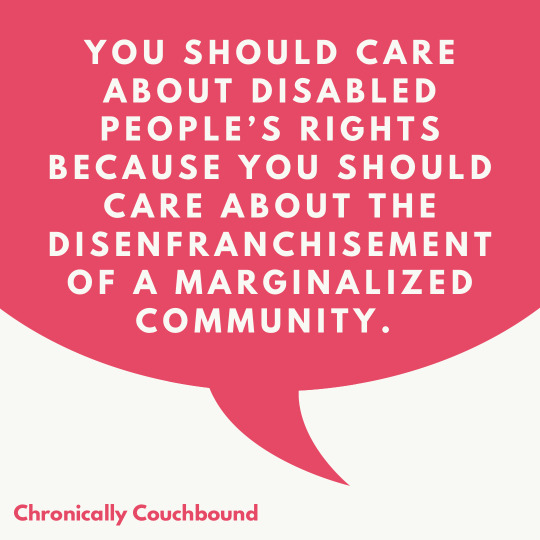
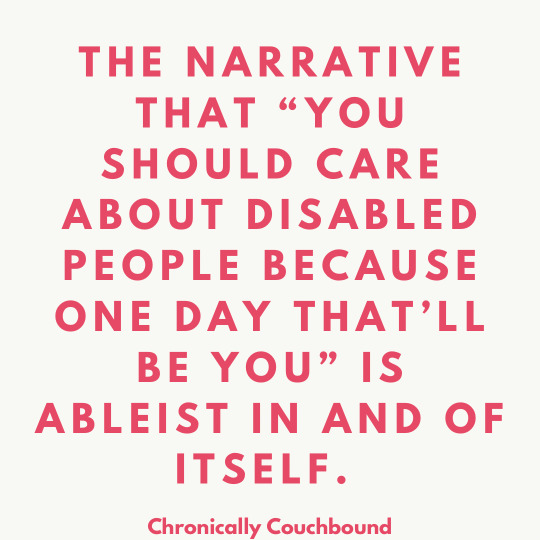
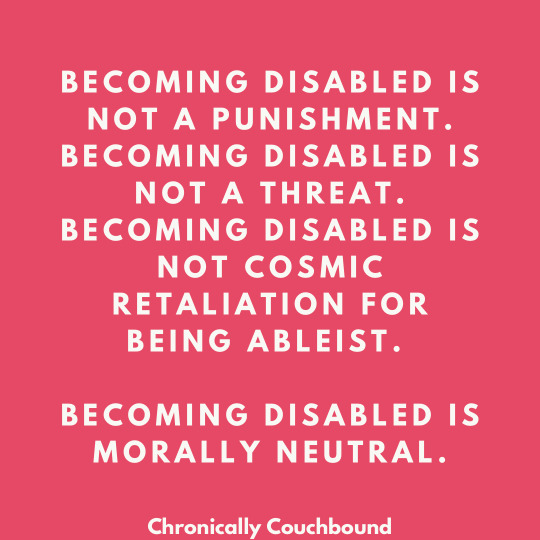
A dopamine-friendly version of this post for my fellow neurodivergent people who might need it!
•
[ID: three photos, all in a coral and white color scheme, text reads: “You should care about disabled people’s rights because you should care disenfranchisement of a marginalized community.” The next reads: “The narrative that you should care about disabled people because one day that’ll be you is ableist in and of itself” the last photo reads: “Becoming disabled is not a punishment. Becoming disabled is not a threat. Becoming disabled is not cosmic retaliation for being ableist. Becoming disabled is morally neutral” My blog name, ‘Chronically Couchbound’ is at the bottom of each photo. End ID]
#disability#chronically couchbound#disabled#disabled pride#disability pride#cripple punk#cripplepunk#not your inspiration#accessibility#disabled liberation#ableism#disabled rights#disability rights#I will not pander to my oppressors#disabled unity#disabled equity#ada#handicap accessible#wheelchair accessible#sensory friendly#dopamine friendly#sensory enriched posts
857 notes
·
View notes
Text
Saying that cannabis isn’t a drug further stigmatizes drug use. Cannabis is a drug, and that’s okay. When you say it’s just a plant or it’s just medicine, while both those statements are true, it is harmful in many ways. People who use drugs are not bad. Drugs are not bad. Stop stigmatizing drug use and start encouraging safe drug use.
531 notes
·
View notes
Text
Intelligence Doesn't Equal Morality
Intellect is rooted in ableist systems and stupidity and intelligence are pointless social constructs that don't relate to morals or character.
I try to be a pretty good person, I fight for human rights, I regularly engage in mutual aid, and I care for my community. I try to do the right thing and support causes I care about and make positive changes in the world.
But I also am not very smart. I have several neurodevelopmental disorders, as well as cognitive disabilities. I can’t do simple, basic math, it’s hard for me to remember facts or algorithms, I rely entirely on spellcheck and speech-to-text to write, I failed many classes in high school and I barely passed with a low GPA, I had low pSAT scores and I never took the SATs. I moved around a lot all through school starting in third grade, and I missed a lot of basic fundamentals in learning (like how to do division and multiplication) so when I went to a different school they had already passed it and expected me to know. After my TBI, I could barely read AFTER I was cleared from my “concussion” symptoms because letters and words would flip around and I’d get headaches. Which still happens sometimes.
A lot of people see me as smart because I've learned a lot of academic language and can formulate thoughts into cohesive posts. But I lack a lot of necessary skills and rely on my caretakers to assist me. Things like budgeting and planning are extremely difficult for me. If I need to do simple addition or subtraction, even with a calculator, I quickly get confused and struggle. I forget basic information about myself all the time, let alone other subjects. I'm talking, has to check my ID for my birthday type confused. Doesn't know my name or address or what year it is confused. It happens daily, sometimes multiple times a day. Being able to type out posts like this often takes weeks and many adaptive tools to get there. Focusing is extremely difficult on many fronts, severe chronic pain, ADHD, dissociation, fatigue, migraines, and TBI, are just some of the contributing factors. I struggle daily with many things because of my lack of intellect.
I’m also privileged in the fact that I had some access to education as a homeless youth, that I had some supports in place to help me (towards the end of school), that I was somewhat able-bodied at the time and could walk or bike to and from school when the school system didn’t provide transportation. I was fortunate to have a chance to succeed, and I’m proud that I graduated high school because it was a difficult task for me, and others often aren’t offered that chance or get accommodations. I almost didn’t and I dropped out many times before graduation. I passed on sheer luck and what little privileges I had.
That all being said, me being stupid (reclaiming it here) doesn't make me a bad person. I don't hurt people because I can't do math. I may mess up things or get confused but it doesn't make me want to harm others.
We often (wrongfully) equate morals with intellect. Being ‘stupid’, ‘dumb’, or an ‘idiot’ doesn’t automatically make someone a bad person. Plenty of evil, awful, and abusive people are extremely intelligent.
I see this most notably with people advocating for IQ tests to be able to vote. Often from left-leaning people, in hopes it'll make the right (that they view as unintelligent), unable to vote. The reality is, it just hurts some of our most vulnerable members of the community while not actively doing anything to restrict some of the most dangerous members of our community-- those who know what they're doing to harm others and deliberately doing so. My voice matters, and I speak up against injustice and participate in dismantling oppressive systems. Taking away my right to vote won't make the right stop oppressing minorities (which also puts a lot of faith into the two-party voting system, which is a post for another day).
Additionally, legislative measures that discriminate against intellectually disabled people such as IQ tests for voting are also rooted in racism and classism.
Yes, education can be a vital tool when it comes to addressing discrimination and creating safer communities. But the kind of education that is measured with an IQ test (or any test) isn't the same. Building compassion and caring for others can (and should) happen at any IQ level. We can all practice this, we can all participate.
It harms our communities and stagnates our progress when we equate intelligence with high morals.
#disability#chronically couchbound#disabled#disabled pride#disability pride#cripple punk#cripplepunk#intellectual disability#neurodevelopmental disabilities#cognitive disability#brain fog#adhd#audhd#autism#neurodivergent#neurodiversity#actuallyautistic#autistic#neurodivergence#tbi survivor#iq test#voter rights#ableism#chronic pain#dissociation#dissociative identity disorder#dissociative amnesia#amnesiac#IQ score#Low IQ
1K notes
·
View notes